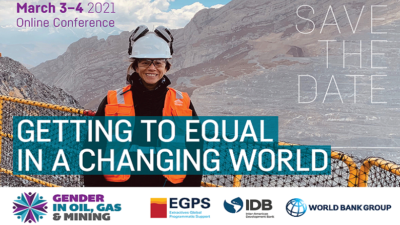CALL FOR PROPOSALS
Submission Deadline: November 30, 2020, 11:59 PM ET
The World Bank’s Extractives Global Programmatic Support (EGPS) Trust Fund and Inter-American Development Bank are pleased to solicit proposals for the second Global Gender Oil, Gas and Mining Conference to be held virtually on March 3-4, 2021.
We are hoping for innovative sessions exploring the theme of Getting to Equal in a Changing World. To that end, we welcome interested stakeholders to submit case studies, papers, presentations, and emerging data that explore one of more of the conference’s subthemes. Submissions may take the form of full papers, power point presentations, visual media, ted-style talks, or other creative formats. They should discuss innovative ways in which women’s rights and gender equality are being advanced in the oil, gas and mining sector. The submission should also identify and discuss the challenges, opportunities, interventions, and lessons learned.
Those interested should submit a 500-word abstract by November 30, 2020to wbextractives@worldbank.org.
The Organizing Committee will evaluate all submissions in terms of originality and relevance. Authors of accepted submissions will be contacted by December 23, 2020, at which time they will be invited to send a full paper or a detailed presentation no later than 45 days prior to the conference.
Subthemes
Under the overarching theme of getting to equal in a changing world, the conference will explore the following subthemes:
- The gender-dimensions related to the changing nature of work in oil, gas, and mining in light of new technologies, automation and digital disruption. In Latin America, governments have recently reported slight increases in women’s labor force participation in the mining sector. This has been partly attributed to the fact that new technology has introduced more automized work, reducing the need for heavy labor previously considered too arduous for women. What can oil, gas and mining learn from other sectors when it comes to the changing nature of work? And what are oil, gas, and mining companies or governments doing to promote a gender-responsive approach towards these changes?
- Gender-dimensions in times of crisis. Globally, the COVID-19 pandemic has revealed significant gender-implications for health, education, economic conditions, and agency. As the effects of COVID-19 become more apparent, how are the oil, gas, and mining sectors adapting to curb the gendered-impacts of the crisis in both the short and long-term? What specific challenges are women and girls in mining communities facing and how are these challenges being addressed? What can we learn from other crises and their responses, such as Ebola, on how women and men fare differently in mining areas?
- How efforts to decarbonize energy systems and the greening of economies affect women. The transition to a low-carbon economy may have gendered-impacts, and women’s role in the transition may look different. Additionally, the general greening of economies may also present different social, economic and political barriers for women in the extractive sectors. Where are the greatest opportunities for women and men to work in these new economies? What will be required in terms of education to prepare women to seize opportunities on equal footing as men?
- Women’s decision-making, voice, and agency. Closing gender gaps in mining, oil, and gas and associated infrastructure sectors cannot be accomplished by solely increasing women’s labor force participation. Women’s economic empowerment cannot happen in the absence of women’s social and political empowerment. Women should meaningfully participate in decision-making processes in the oil, gas, and mining to share the benefits of the sector. How successful have women-led movements been in increasing their decision-making with respect to mining, oil and gas development? What types of structures lend themselves to women’s agency? Where are today’s biggest barriers to improving their decision, voice and agency?
- The need for more and better sex-disaggregated data in the extractive sector to be able to identify and solve the most pressing issues for women in the rapidly shifting global landscape. As the working landscape shifts, stakeholders need up-to-date and detailed data on women’s participation in oil, gas and mining to better assess gender gaps and design appropriate interventions. What innovations are at our fingertips when it comes to data collection? What does recently collected data tell us about the state of women in oil, gas and mining industries at a country and/or global level?
- How to address specific vulnerabilities to gender-based violence.Gender-based violence (GBV) for both women and men continues to present significant issues in oil, gas and mining communities. Migration of workers into these communities can exacerbate the risk of GBV, increasing women’s and children’s vulnerability. Harassment of women in underground mining is well documented. How have companies, governments or civil society responded?
For more information go to this link
IWiM will be participating in the virtual conference and our Global WIM Summit will happen on the two days prior, to align with the World Bank’s event.

